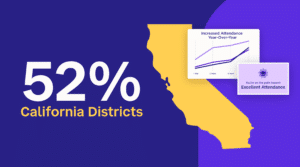
Featured Resource
Why Over Half of California School Districts Trust SchoolStatus
Read More >Join Mission: Attendance to reduce chronic absenteeism in 2025-26! >> Learn How <<






What’s something that focuses your work daily? Teresa Engler, instructional technology coach in McGuffey School District, shares three guiding principles that strengthen relationships with teachers and coaching programs.
W
orking as my district’s instructional technology coach for the past 5 years has been very rewarding. Still, it takes a lot of self-discipline, energy, and motivation—especially after a long holiday break! Over the last few years, I’ve manifested three coaching mantras that not only help me get back in the swing of things but also lay the foundation for a solid program that’s built to last.
I always say that what happens between the coach and the teacher stays between the coach and the teacher. The coach-teacher relationship is like that of lawyer-client privilege; It’s private, secure, and without judgment.
Developing a trusting relationship allows teachers to freely share their concerns and ask for help in certain situations. It fosters a partnership and successfully implements strategies designed to address challenges and contribute to student success.
I periodically take notes during class visitations. Those notes are composed on an electronic document and immediately shared with the teacher. The benefit of taking notes is that the information collected can then be added to the teacher’s portfolio, used as evidence for professional growth and development, or filed away as an artifact for the teacher’s eyes only. I’m also cautious about sharing success stories with other staff members or posting on social media; I always ask beforehand for the teacher’s permission.
Coaching is a partnership that develops over time. The partnership is nurtured as the coach provides support and personalized professional development that guides teachers as they navigate challenges and search for new methods to engage learners and increase student achievement.
Our formal coaching program has cycles that typically last 6-8 weeks. Coaching sessions begin with an initial meeting where the teacher and I discuss specific challenges or specific learning needs for the students. We talk about the good, the bad, and the ugly in terms of what works, what hasn’t, and what could work but may not fit their particular needs. The teacher and I brainstorm ideas and strategies to address these challenges. We coordinate times to meet and discuss the strategies, I visit the classroom, we reflect together about the process, and then, as a team, we plan for the next steps.
Many of the teachers I’ve worked with on cycles are what I refer to as “repeat customers.” Each year, they request coaching for multiple cycles, and we work together on various challenges. I’ve grown accustomed to their teaching styles and preferences, and I’m familiar with what they’ve tried and what they enjoy using with their students. I’m also able to plan for various times throughout the year because certain teachers will schedule me to work with them on recurring units of study during the same time each year.
Like clockwork, I’ll prepare for an ELA novel in October, a virtual field trip in January, and a science experiment in April. This coach-teacher alliance allows the coaching process to become a routine that feels natural and familiar and fosters ease of collaboration.
When all areas of the coaching cycle “click,” a seamless working relationship evolves between the coach and the teacher and sparks conversations that lead to positive learning environments for students. Once a strong working relationship is established, coaching becomes an integral part of the school culture.
The personalized part of coaching is unique in that it addresses the specific needs of the individual teacher. Some teachers are just dipping their toes in the edtech pool, while others are expertly and effortlessly combining apps and tools and integrating them in daily lessons. Each situation requires differing levels of coaching, and my role is to help teachers achieve their goals.
Coaching in our district is voluntary and is not intended to be evaluative or used to rate an individual’s performance. Because of this, teachers cannot be assigned to coaching or directed to participate in coaching as part of an improvement plan. Instead, teachers willingly sign up to be a part of a cycle or to work on various challenges throughout the year.
Some teachers want to improve lessons or grow professionally, and although our program is non-evaluative, I like to offer official verification of their time and effort invested with coaching. The Planning Form is designed to give documentation to teachers as they work with the coach. As teachers work through a cycle, the coach uses a form to record information collected during meetings and class visits and shares the notes with the teacher. The teacher may use the notes as evidence for professional evaluations or as an artifact for professional portfolios.
Identifying a focus challenge and setting goals are vital components in the coaching process. Once a focus challenge is identified, goals are set, and the coach helps implement strategies specific to the challenge. Then, when goals are met, the coach and teacher can reflect and move forward to a new challenge.
Focusing on these mantras strengthens any coaching program and is central to building relationships and creating a culture of trust, collaboration, and professional growth. If you have any of your own coaching mantras, please share them below!
Teresa Engler is a K-12 instructional technology coach in the McGuffey School District. In addition to her role, she is a Google Certified Teacher, a Google Certified Coach, and a part of the Dynamic Learning Project. Outside of her organization, Teresa is a Keystone Technology Integrator (KTI) involved with Southwest Region – PAECT and has begun a series of online training opportunities with #LunchOnLine where she invites colleagues to share their educational experiences.
Her passion for education doesn’t stop there! Teresa has presented about coaching and The Dynamic Learning Project at Pete&C, participated in the Google for Education Playground in Philadelphia where she presented topics about integrated technology in middle school ELA classes and using digital badges with K-12 teachers, and continuously shares her passion for EdCamp by being active on Twitter via #edcampRL.
Be sure to follow Teresa on Twitter @MrsEngler1!
{{cta(‘352a410e-db79-4f33-a482-d301e8041965′,’justifycenter’)}}
 Teresa EnglerTeresa Engler, a K-12 instructional technology coach in the McGuffey School District, wears multiple hats: Google Certified Teacher, Coach, and Dynamic Learning Project member. She's a Keystone Technology Integrator, leading #LunchOnLine training sessions and sharing educational insights. Teresa's dynamic presentations at Pete&C and Google for Education Playground highlight her commitment to integrated technology and professional development.
Teresa EnglerTeresa Engler, a K-12 instructional technology coach in the McGuffey School District, wears multiple hats: Google Certified Teacher, Coach, and Dynamic Learning Project member. She's a Keystone Technology Integrator, leading #LunchOnLine training sessions and sharing educational insights. Teresa's dynamic presentations at Pete&C and Google for Education Playground highlight her commitment to integrated technology and professional development.
News, articles, and tips for meeting your district’s goals—delivered to your inbox.






